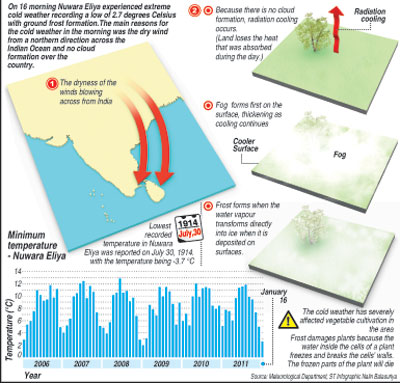The unusual drop in temperature in Nuwara Eliya has had widespread repercussions, with people finding it difficult to cope with the extreme weather, damage to crops and drop in water levels.
Last Monday (16), the temperature in Nuwara Eliya dropped to 2.7 Celsius accompanied by ground frost. In 2009, the temperature dropped to 2.6 Celsius. Similar temperatures were experienced in 1929 and 1953.
However, the lowest recorded temperature was on June 30, 1914, when it went down to -3.7 Celsius.
Meteorology Department Deputy Director M.D. Dayananda told the Sunday Times that such low temperatures were due to the usual passage of wind through the North-East border during the North-East monsoon, which deviated to a more northerly route, passing over the Himalayas, across the Indian Ocean. This would result in cold weather in the morning and night.
He said that such cold weather would also prevail because there is no cloud formation over the country, which results in radiation cooling, fog formation and, in the extreme, frost formation. “This weather in Nuwara Eliya is expected to continue for the next three to four days. It is not an unusual experience during December and January,” he said.
Mr. Dayananda said that it would be difficult to predict what the weather would be like in April, but said that, since it is the inter-monsoonal period, evening thunder showers and a warm climate could be expected. Nuwara Eliya District Secretary D.P.G Kumarasiri told the Sunday Times that, though the city seems picturesque, the climatic patterns have severely disrupted the lives of the people in Nuwara-Eliya due to the cold weather.
“Due to such extreme weather, crops such as beetroot, potatoes and lettuce were damaged. During the day, the sunlight is very bright and strong, and the streams have dried up,” Mr. Kumarasiri said.
He also said that many foreigners and local tourists are visiting the city to witness the scene. The Wildlife Department staff at Horton Plains said that they were finding it very difficult to carry out their duties in such extreme weather, with last Monday the temperature dropping to 1.5 Celsius at Horton Plains.
Central Province Agriculture Dept Deputy Director Kusum Seneviratne told the Sunday Times, that extreme weather changes in the district had damaged crops in certain areas in the Ragala-Nuwara Eliya area. “Within four days – January 16 to 19, 50 acres of leeks, beetroot, carrot, potatoes and lettuce cultivation were affected in Kandapola, Galpalama and Aluthpara due to the cold and warm weather fluctuation,” she said.
She said that crops covered with frost get burnt when exposed to strong sunlight. To avoid such situations, cultivators should water the crops early morning, so that, when they are exposed to sunlight, the crops would not get burnt.
A survey was carried out by the Agriculture Dept to collect information on the damaged crops.Nuwara Eliya General Hospital Deputy Director Dr. Raveendra Pathiratne told the Sunday Times that though there was no immediate increase in weather related illnesses, it would take some time for the outcome to manifest itself.“In a short period, the difference in the cases would not be obvious. At least a week’s time is needed to study the consequences. As of now, we don’t see an increase in asthmatic or heart disease cases due to the cold weather,” he added.
Dr. Pathiratne explained that most people in these cold climes have adapted to this type of weather fluctuations. The people already take precautionary measures to prevent becoming seriously affected. Commenting on the hot water facility within the hospitals, Dr. Pathiratne claimed that most of the wards are provided with hot water geysers, but potable hot water facilities are less, as there are no hot water dispensers.
“We foresaw the need for potable hot water for patients in December and January, and last week we ordered some hot water dispensers,” he said.
Principals of schools in the area claimed that, despite the difficulties, there was no drastic drop in attendance of students.
Surviving extreme elements
Dr. Raveendra Pathiratne said that, usually, low temperatures, affect asthmatic and elderly heart patients. If the temperature drops below freezing, blood related diseases, headaches and muscle cramps will also occur.
“In such a situation, the elderly should stay indoors very early, before sunset. They should have a wood-fire burning to maintain a warm environment. They should wear warm clothes, gloves and socks. It is advisable to take warm drinks. Pregnant females and infants should extra care to keep warm,” he said. |


